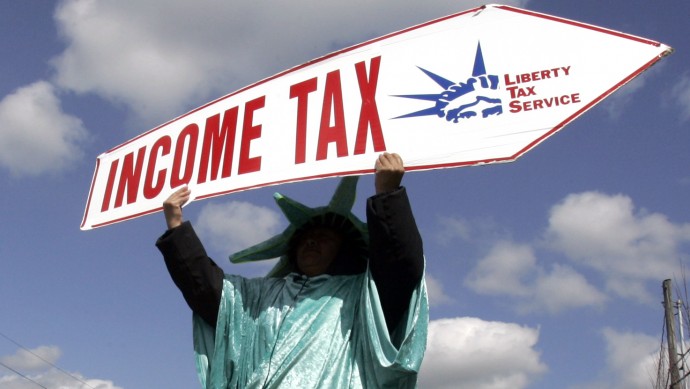
“The American people had a choice between two divergent views and they chose both of them. And the result of that is we’re going to have a continued impasse on the budget.” Scott Lilley, Center for American Progress
(NEW YORK) MintPress – Indeed, President Obama’s victory and the continuation of the status quo in both the House and Senate suggest tough times ahead in terms of resolving some of the biggest issues facing lawmakers. Perhaps most pressing at the moment: The so-called “fiscal cliff.”
On Dec. 31, all of the Bush era tax cuts are set to expire, along with Obama administration stimulus measures like the payroll tax holiday, while automatic cuts in federal spending will take effect on Jan. 2.
Those cuts — known as budget sequestration — are the outcome of last year’s failure of a budget-cutting super committee to agree on a plan to reduce the national deficit. They are projected to total $1.2 trillion and will be spread out evenly each year from 2013 to 2021.
They are also divided evenly between defense spending, excluding spending on wars, and across-the-board domestic spending, with the exception of such entitlements as Social Security and Medicaid.
The total cuts for 2013 will be $109 billion, according to a White House Report released in September. The Congressional Budget Office has predicted that taking that much money out of a still stagnant economy could trigger another recession.
Sen. Mitch McConnell of Kentucky, the Senate’s top Republican, said early Wednesday that since President Obama won re-election, it’s now up to him to propose ways to avoid a crisis.
But as Lilly points out, the Constitution places budgetary responsibility into the hands of Congress, and the public should look there for signs of progress.
Widespread opposition to sequester
Under the terms of the cuts, most defense programs face a 9.4 percent reduction, while most domestic programs would be sliced by 8.2 percent. Medicare would be trimmed by 2 percent, while other entitlements would be slashed as much as 10 percent.
Many top defense officials have warned the cuts would lead the military to be hollowed out, while Democratic legislators have cautioned about the impact on crucial social welfare programs. And all industries dependent on federal spending say there would be major job losses.
Yet both parties agreed to the sequester as part of the Budget Control Act (BCA) passed in August 2011. At the time, the government was approaching its debt limit, and it needed to be raised through a congressional vote or the country would default.
Republicans demanded substantial cuts in exchange for raising the limit, and Obama and congressional leaders reached a compromise with the BCA. It allowed the debt ceiling to be raised by $2.1 trillion in exchange for the establishment of a bipartisan supercommittee charged with creating a deficit reduction package of $1.2 trillion by Nov. 23, 2011 or face the automatic cuts in 2013.
Not surprisingly, the group failed to reach a deal.
Bargain hunting
Since then, both Democrats and Republicans have offered new proposals to try to avoid the sequester, but so far have not been able to reach a deal.
The GOP still doesn’t want to raise taxes to generate revenue, and Democrats are still reluctant to make major changes to entitlement programs to save money.
A plan that came out of the House Budget Committee, headed by future Mitt Romney running mate Rep. Paul Ryan (R-Wis.), proposed slashing $83 billion in federal retirement benefits, saving $49 billion by capping medical suits, slicing about $48 billion from Medicaid programs and cutting food aid by more than $36 billion.
A Congressional Budget Office (CBO) report revealed that under the House plan, some 22 million households with children would lose money to buy food, 300,000 kids would be cut from school lunch programs and 300,000 young people would lose health insurance.
In October, a bipartisan group of senators came up with a plan to set a framework for tax increases and spending cuts that would total around $4 trillion over 10 years.
But there were still major hurdles, and New York Sen. Charles Schumer, the Senate’s third-ranking Democrat, said the idea of a tax code overhaul that could bring in more revenue, lower the top tax rates and still protect the middle class from tax increases was “little more than happy talk.”
Moving forward
Congress now has just a few weeks to come up with an alternative to the automatic cuts, but if legislators try to avoid the sequester without replacing it with a real deficit reduction program, the U.S. could face another debt downgrade from the credit rating agencies.
There is already some talk of passing a short-term stopgap budget plan during the lame-duck session in order to buy legislators more time to come up with a permanent replacement for the sequester.
In the meantime, in his acceptance speech, Obama vowed that in a second term, he would continue to listen to people who may disagree with him and said that he is “more determined and more inspired than ever” about the work that needs to get done for the country.
Let’s hope Congress feels the same way.


